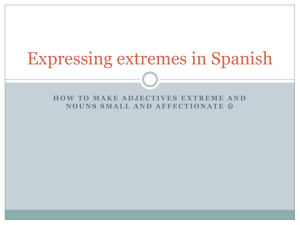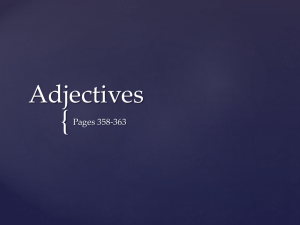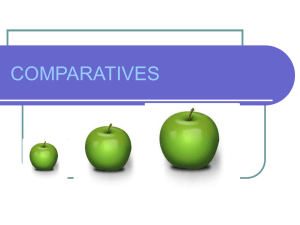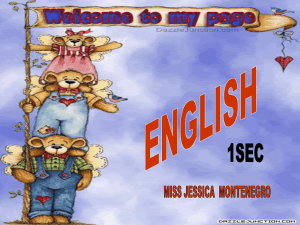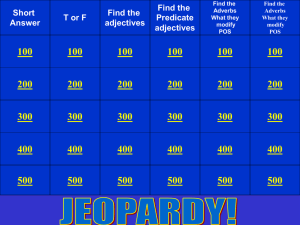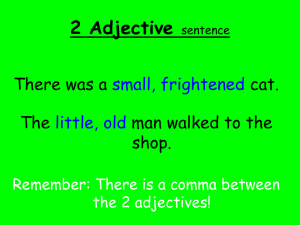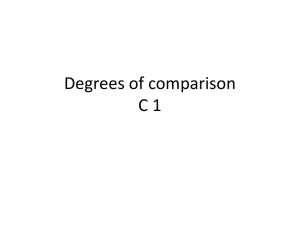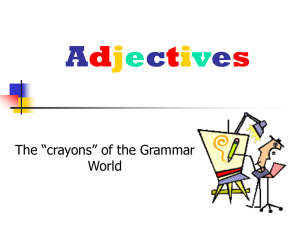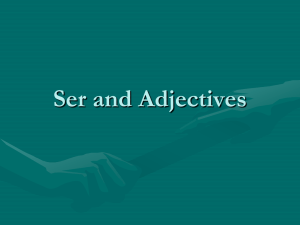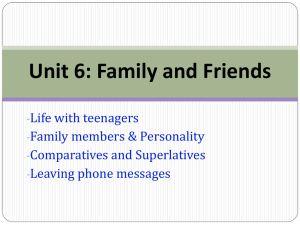english-lecture
advertisement
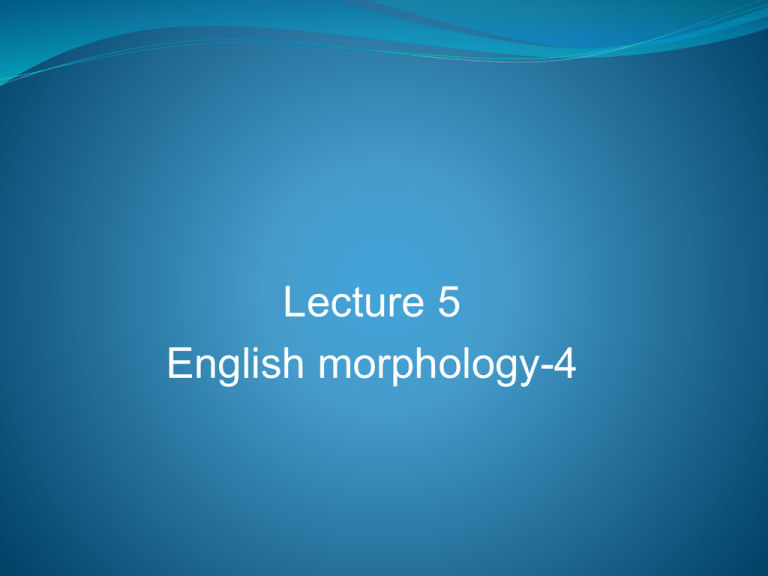
Lecture 5 English morphology-4 Lecture content Adjectives Identifying the adjectives Adjective classification Use adjectives correctly Adjective degrees Past simple tense - Declarative or statement - Interrogative or question - Negative Adjectives An adjective modifies (describes or limits) a noun or occasionally a pronoun. For example; a red barn a swift ride a happy woman this side seven crowns some cookies [limiting] Sometimes adjectives need the in front of them. the rich the poor the deaf the dead the disabled the unemployed There are many adjectives ending in –ing and –ed. Jane’s job is boring. Jane is bored (with her job). Adjective classification Simple adjectives Derivative adjectives Compound adjectives /Ýíãèéí/ /¿¿ñìýë/ /á¿ðýëäìýë/ Long Young Old Rich Deep nice Comfort + able Use + less Beauty + ful Un + happy Il +legal Dis +obedient Religion + ous = religious /al, ial, ant, ent, able, ible, y, ic, ous, ive, less, ed, ish, ing/ Empty-headed Soft-hearted Long-legged Mad-made Absent-minded Long-sighted Snow-white Adjective classification Adjectives Mongolian Examples Qualitive adjectives ×àíàðûí òýìäýã íýð Good, large, short, expensive Relative adjectives Õàðüöàíãóé òýìäýã íýð Golden, woolen, wooden, drunken Interrogative adjectives Àñóóõ òýìäýã íýð What, which, whose Quantitative adjectives Òîî õýìæýýíèé òýìäýã íýð One, eleven, some, many, much, a few, little Distributive adjectives Ò¿ãýýõ òýìäýã íýð All, every, either Use adjectives correctly Attributive use Predicative use An uncle of mine is a rich man. She is a lucky girl. An uncle of mine became rich. She is lucky. Predicate adjectives; Forms used in front of noun Alike like, similar Alive live, living Alone lone Afraid frightened Asleep sleeping A predicate adjective appears after a linking verb such as be. It cannot appear directly in front of the noun that it describes. The snake on the rock was alive. The live snake was lying on the rock. Use adjectives correctly Verb forms ending in –ed and –ing can be used as adjectives. For example, the verbal adjectives cleaned and cleaning come from the verb to clean. The woman cleans the car. The cleaning woman worked on the car. The woman put the cleaned car back in the garage. -ed and –ing adjectives Type Meaning Use Example -ing active It does the action of the verb. The happily playing children were his grandchildren. -ed passive It receives the action of the verb. The girl threw away her played toys suddenly. Use adjectives correctly Sometimes we use two or more adjectives. My brother lives in a nice new house. In the kitchen there was a beautiful large round wooden table. Adjectives like new/large/round/wooden are fact adjectives. They give us factual information about age, size, colour etc. When there are 2 colour adjectives, we use and; a black and white dress Adjectives like nice/beautiful are opinion adjectives. They tell us what somebody thinks of something or somebody. Opinion adjectives usually go before fact adjectives. I was met an interesting young man yesterday. It’s the first day of nice long summer holiday. Use adjectives correctly We use adjectives after be/get/become/seem; Be careful ! Your friend seems very nice. As the film went on, it became more and more boring. I’m tired and I’m getting hungry. Compare adjectives ending in –ing and –ed. The –ing adjectives tells you about the job. The –ed adjectives tells you how somebody feels (about the job). My job is boring. I’m bored with my job. interesting. I’m not interested in my job any more. tiring. I’m always tired when I finish work. depressing. My job makes me depressed. Adjective degrees Adjective Comparative Superlative Old Young Nice Older Younger Nicer Oldest Youngest Nicest Thin Big Hot Thinner Bigger Hotter Thinnest Biggest Hottest Expensive Beautiful Clever More expensive More beautiful More clever Most expensive Most beautiful Most clever Crazy Pretty Happy Crazier Prettier More happy Craziest Prettiest Most happy Good Bad Little Better Worse Less Best Worst least Adjective degrees Comparison; I’m taller than you. You’re more patient than me. The exam was quite difficult – more difficult than we expected. They have more money than we have. You are more handsome than Bat is. You’re taller than him. He is not as clever as her. Henry is rich. He is richer than Arthur. But he isn’t as rich as John. Adjective degrees Superlative; This hotel is the cheapest in town. The oldest person in our family is my grandmother. Dorj is the one of the most hard-working workmen of our company. Bolor is the prettiest girl in our class. What is the most exciting movie you have ever seen? Ghost is the most exciting movie I have ever seen. Tuya is the best student in our class at math, but Bold is the second best student at math. Past simple tense Something happened once in the past we use Past simple tense when we express about it. Key words: yesterday morning, yesterday afternoon, yesterday evening last night, last week, last month, last year 3 days ago, 3 weeks ago, 3 months ago, 3 years ago this morning Past simple tense Statement Subject I, You, we, they Verb He, she, it verb+ed Question I Did you, we, they he, she, it verb? Negative I, You, we, they He, she, it didn’t verb Past simple tense Verb present Past simple Past participle Work worked worked Live lived lived Go went gone Write wrote written Study studied studied Cut cut cut Teach taught taught Stop stopped stopped Past simple tense a. b. c. d. e. f. What did you do yesterday afternoon? Yesterday afternoon I played tennis at school. Where did you live 3 years ago? I lived in UB 3 years ago. Did you meet Bold last night? No, I didn’t. I met him last week. Did you go out yesterday evening? Yes, I did. I went to the cinema with my friends. I didn’t study English when I was at school. I studied English when I was a student at University. I cut my finger while I was cooking. He was walking home when he met Ann. Thanks for your attention!
